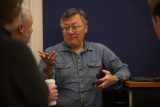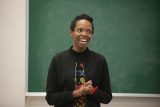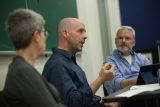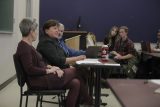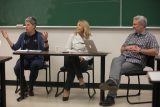FYSM 1310G Psychology of Success, Profs. Matt Sorley and Anne Bowker
Our first-year seminar (FYSM) was focused on the psychology of success and the steps that can be taken to enhance performance at university and beyond. This included a Success Speaker series, which introduced students to various members of the community and their views on reaching our potential. Here are their stories and recurrent themes.
Meet Our Success Speakers (Fall 2019)
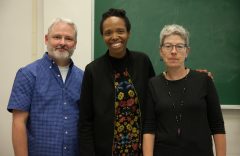
Prof. Matt Sorley with Kellylee Evans and Prof. Anne Bowker
Kellylee Evans is an award-winning singer/songwriter who performs internationally. Originally from Toronto, Kellylee completed BAs in both Law and Legal studies and English, because her parents did not believe that a career as a musician was worth pursuing. After achieving a great deal of international success as a musician, Kellylee sustained two significant head injuries over a period of three years, and has had to redefine her definition of success to include both making herself and others happy, but also incorporating work/life balance into her daily routine.
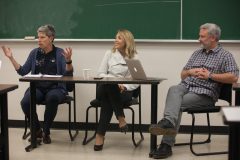
Prof. Anne Bowker, Dr. Rouba Fattal and Prof. Matt Sorley
Dr. Rouba Fattal has a Ph.D. in Political Science from Leuven University in Belgium and teaches sessionally at Carleton in the Norman Paterson School of International Affairs. Originally from Syria, Rouba grew up in Saudi Arabia and did not have a clear vision of her future at 18. After completing a degree in Microbiology to please her parents, Rouba followed her passion and studied Political Science. Currently, Rouba works full time for the federal government and is the founder and chairperson of the Kanata Small Business Network. In 2019, she was voted one of the top 25 Canadian immigrants by RBC.
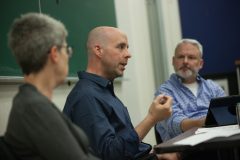
Dr. Benoit-Antoine Bacon
Dr. Benoit-Antoine Bacon is the President of Carleton University and a professor, in the Department of Psychology. Benoit grew up in Montreal in an abusive household and spent a significant part of his life using drugs and alcohol to cope. Over the past 10 years, Benoit has worked on overcoming his addictions and making self-determined decisions about his life. According to Benoit, healing is always possible, and a journey of healing can take a lifetime.
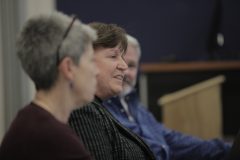
Prof. Anne Bowker, Dr. Cecilia Jorgenson and Prof. Matt Sorley
Dr. Cecilia Jorgenson recently received her Ph.D. in Developmental Psychology at Carleton and is currently an instructor in the Department of Psychology. Cecilia grew up in a poor neighbourhood of New York and is the only member of her family to have a high school degree. She credits her achievements to having an extremely supportive partner and children. Cecilia speaks very positively about her career in the US Navy.
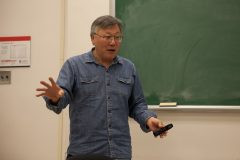
Dr. Bruce Tsuji
Dr. Bruce Tsuji is an instructor in the Department of Psychology at Carleton University, and graduated from Carleton with his Ph.D. in Human Computer Interaction in 2011. Bruce has a background in high tech and had a very successful career working for Nortel, among other companies, before returning to school for his Ph.D. Bruce’s goals and definitions of success have changed across the life course, with meaningful experiences and positive relationships, replacing earlier goals of money and status.
Definitions of Success
When I was five years old, success to me meant being happy, and it definitely meant making my mom happy and making my dad happy. (Kellylee)
To be able to help as many people as possible; to reach outside of my boundaries and be able to make an impact on someone else’s life. (Rouba)
The path to self-determination starts with looking at yourself objectively. If you don’t have a clear view of yourself, you’re living in delusion, then you can’t make self-determined decisions, and you can’t be successful (Benoit)
Success is about being respected in whatever field you’ve chosen to go into — so being an expert, feeling like your opinion matters, feeling like you’re noticed in your field. (Cecilia)
Prof. Bruce Tsuji
Success is about the goals that we set for ourselves; in order to achieve them, we have to spend time on them; and they’re not necessarily explicit. – Bruce
Definitions of Success Change Over Time/With Age
I thought making everybody happy also made me happy. But my definition of success had to keep changing because I kept changing and growing and learning. Today my definition of success has to do with balance. I don’t have a good sense of slowing down; I had to learn to budget time for self-care, budget time for work, for play, for rest, for family and friends. (Kellylee)
Many of my goals were not really meaningful or important to the expanse of my life. Some of them took place over decades; some of them took much less time. For me, money and prestige didn’t have a lasting impact (although they were important at one time). The goals that seem to matter are love (close relationships) and experience (the things that I’ve done that have enriched my life). (Bruce)
At 18, I never thought of being successful, either personally or outside myself. My ideas were very murky. To be successful, you have to follow your passion, listen to that gut feeling. You cannot succeed if it is somebody else telling you what to do. (Rouba)
Success is to come to a point where you say, “This is how I am”. I’m able to see the world exactly how it is and to make self-determined enlightened decisions for myself and the people I love. I moved from “Can I get through this day?” to “I wonder what interesting things I can get into today?” Every day is an adventure when you’re in the right mindset. (Benoit)
Success became more reasonable as I got older; a work-life balance became more important to me (Cecilia)
Kellylee Evans
I thought making everybody happy also made me happy. But my definition of success had to keep changing because I kept changing and growing and learning. Today my definition of success has to do with balance. I don’t have a good sense of slowing down; I had to learn to budget time for self-care, budget time for work, for play, for rest, for family and friends. – Kellylee
Sometimes Your Goals Are Different From Your Family’s Goals
My first degree is in Microbiology and Immunology that I did not enjoy. For my family, to be successful is to be a doctor, dentist, engineer or pharmacist. When I told my mother I wanted to study Political Science, she cried. (Rouba)
Even though I really loved singing, the idea of taking music as a subject (in high school) was not allowed. I didn’t take any pride in any music I did and I was afraid of making my parents uncomfortable and upset. When I was growing up, I had three choices (of career), I could be a lawyer, a doctor or an engineer. The love that I had for being a musician, I had to keep buried deep inside. (Kellylee)
Coming from a low-income neighbourhood, my family had a lack of appreciation for education. No one in my family has a high school diploma. (Cecilia)
Prof. Anne Bowker, President Dr. Benoit-Antoine Bacon and Prof. Matt Sorley
If you haven’t seen sane adults in your family environment, then you don’t know how to live. – Benoit
Success Often Involves Overcoming Adversity
When you grow up in an abusive environment, when you are always living under threat; things are never safe. You don’t think about success, you think about survival. I was clinically depressed for a long time; I drank and used various drugs for maybe 20 years, and then you’re not thinking clearly. (Benoit)
If you come from a form of trauma, there’s an instinct to seek the answers outside of yourself. In my experience, until you sort out what’s inside, nothing in the outside world will satisfy or fulfil you (Benoit).
The first challenge was language. When I came to Canada, I couldn’t speak English or French, only Arabic. There was also a challenge with fitting in. When you are a 1st generation immigrant, you’re always trying to prove yourself, to prove that you belong, that you are worthy. (Rouba)
When my mom passed away, I had to really re-assess what success meant to me. I realized that life is short, and you have no idea how long we have here. I made this huge list of things that I had always dreamt of doing, not just what others wanted me to do. And that list became the impetus for creating the career I have now – which is traveling the world with my music. (Kellylee)
In 2013, I was hit by lightning in my kitchen. I couldn’t walk for 5 or 6 months, it was hard to cut my food, and my brain was damaged. In 2015, I was taking a bath, and I fainted in the tub and hit my head, experiencing my second brain injury. I was no longer about to just push my way through life and make things work. I couldn’t push my body; my mind and my body give up; I almost had a spirit that gave up. I was out of commission for about two years, until I got the Artist in Residence at Carleton position in 2017. It was my first job, post-injury. (Kellylee)
Prof. Anne Bowker, Dr. Cecilia Jorgenson and Prof. Matt Sorley
My biggest challenge was coming from a low-income background. My family had a lack of appreciation for education. There are things that you learn when you come from a middle-class family, things that I had to observe in other people; not knowing what to do in a new situation, and trying to act like you know what you’re supposed to do. You don’t always feel like you fit in. I’ve been middle class for 25 years and sometimes I still feel like I’m faking it. – Cecilia
It’s Not About the Money
Success had never had anything to do with money for me (Cecilia).
Money and prestige don’t really have legs (Bruce).
Successful People Have Supportive Environments
My biggest help came from the most critical people in my life. Anger fueled my success and I wanted to ‘show them’ – people who called me a terrorist (after 9-11). I wanted to show them what we can contribute to this country as immigrants. (Rouba)
My husband has always been my biggest cheerleader. If you don’t have that support from your immediate family, you can get it elsewhere, from friends, from educational institutions. Carleton has been really supportive. (Cecilia)
About ten years ago, I was at Bishop’s University. It was summertime. I had started running and some healing had occurred. This leaves you with the full realization of what your life is like. You feel shame. You don’t know how to do better, there must be somebody who knows how to live. Jamie Crooks was a philosophy professor. I started to run with him. He was the choir director, so I started to sing in the choir. He was also involved in leadership at Bishop’s. If Jamie had been a furniture maker, then maybe I’d be a furniture maker. I was just looking for some sense, and the way he lived his life inspired me. And part of that was getting into the business of leading universities. And 15 years later, I ‘m still doing it. That’s life-changing. (Benoit).
Prof. Anne Bowker, Dr. Rouba Fattal and Prof. Matt Sorley
Growing up (in Saudi Arabia), there were no role models for women. But my mother is a very strong character, opinionated, a strong feminist, at a time and place not to be a feminist, yet she was. That instilled something in me. – Rouba
Education Is Important
Education is critical for success. Education, by itself, is not as helpful as it used to be. You need to network and meet other people. The more people you get to know, the more opportunities become available. (Cecilia)
Completing a Ph.D. in 2011, was an important achievement, that informed a lot of my life going forward. (Bruce)
Successful People Have Passion and Love to Learn
Nobody wakes up and says, Oh, I am passionate about this. You do something, and it just opens up that space. (Rouba)
My passion is helping people, part of that is recognition. I feel happy when people say “Thank you.” (Rouba)
I try to find something fun in every class that I take or any job that I do. (Cecilia)
I remember when women were first allowed into the military academy. That was a remarkable event for me, so I had a goal of going into the military academy. (Cecilia).
The military (Cecilia was in the Navy), is filled with people who don’t know their potential. The military helps to show you your potential. (Cecilia).
Given that the chance to be born is so rare, any attitude other than gratitude towards life is irrational. Life is super hard, and a moment of joy alleviates years of suffering (Benoit).
Even with seven arrows through the heart, healing is always possible. A journey of healing lasts a lifetime (Benoit).
Making mistakes is part of living, but what’s really dumb is when we make mistakes and don’t learn from them. (Bruce)
I realized I needed to make myself happy, so success became about making myself happy. I started to write my own music, created this career for myself. My first album was nominated for a Juno. (Kellylee)
Next
Success Speakers (Winter 2020) included Erica Gilmour (CEO of Hummingbird Chocolates) and Shawn Menard (Ottawa City Councillor and Carleton alumni)(interview details to follow)

